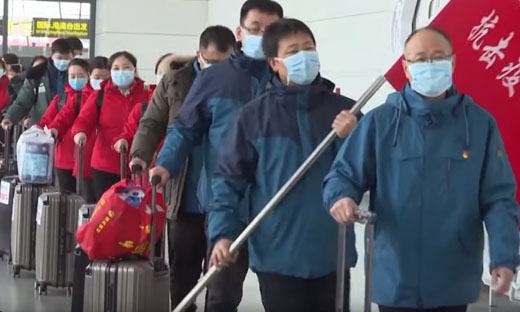by WorldTribune Staff, February 13, 2020
The Chinese Communist Party (CCP) is purging officials from its ranks as the political fallout from the communist government’s handling of the Wuhan coronavirus crisis escalated on Thursday amid a huge increase in the number of reported deaths and infections.

The CCP quickly moved to fire the party chief of Hubei province, the party chief of Wuhan and the head of China’s Hong Kong and Macau Affairs office, reports say.
Hong Kong Journalist Willy Lam said Xia Baolong’s appointment is “bad news for Hong Kong”. “It signals that China will bring Hong Kong under closer scrutiny and tighten control over all aspects of the city,” he said.
Lam is a Jamestown Foundation Fellow, adjunct professor at Chinese University of Hong Kong and member of the WorldTribune.com Board of Advisors.
China on Thursday confirmed 254 additional deaths, the majority of them in Hubei, the center of the outbreak. That brought the total death toll to 1,370. Hubei province also reported an enormous increase of almost 15,000 additional infections.
Related: China’s chilling military benefits from coronavirus, February 11, 2020
“I suspect Xi (Jinping) would have wanted the personnel change to project a sense that he is in control of the situation. The bad numbers undermine that message,” said Sam Crane who teaches Chinese politics and ancient philosophy at Williams College.
“This is clearly Xi’s move,” said Dali Yang, a professor of political science focusing on China at the University of Chicago. “The stakes are high and he needed time to find the right people for the positions to salvage the Hubei, Wuhan situation.”
Earlier this week, a number of health officials reportedly were “removed” from their positions, including the head of the local Red Cross who was removed for “dereliction of duty” over “handling of donations.”
The South China Morning Post reported that academics in China have signed a public petition to demand free speech after the police punished doctors who raised the early alarm about the coronavirus.
Early warnings by local doctors about the virus were largely ignored by Communist Party authorities, with several doctors receiving police punishments for taking their concerns to social media – “spreading rumors”, as the police put it.
The South China Morning Post noted that one of the whistleblower doctors, Li Wenliang, died on Feb. 7 after being infected, “setting off a massive storm of criticism and anger against the authorities on social media across China.”
A clearly concerned Beijing, the report said, “then took the unusual step of quickly parachuting into Hubei a top team from the nation’s anti-corruption agency, the National Supervisory Commission, to investigate how the police dealt with Li Wenliang.”
The coronavirus crisis also escalated in Hong Kong, where the education minister announced that schools would remain closed until at least the middle of March. They have been closed since the start of the lunar new year at the end of January.
In other developments on Thursday, Japan recorded its first death and Vietnam placed 10,000 people under quarantine after six cases were discovered in a cluster of villages – the first such lockdown overseas.
The largest cluster of cases outside of China is on a cruise ship quarantined off Japan’s coast, where 44 more people tested positive for the virus, raising the total number of infections on the Diamond Princess to 218, The Guardian reported.
Meanwhile, a Chinese hardliner notorious for the demolition of thousands of Christian crosses on churches has been appointed the new head of China’s office in Hong Kong, a sign that Beijing aims to further tighten control over the semi-autonomous city, analysts say.
Xia Baolong, an ally of Xi, has been appointed director of the Hong Kong and Macau Affairs Office under the State Council, replacing Zhang Xiaoming, State media reported on Thursday.
Analysts say Xia’s appointment is a signal that China wants to tighten its control over Hong Kong and further curb its civil society.
Professor Ying Fuk Tsang, the director of the divinity school at the Chinese University of Hong Kong, said the appointment of a close ally of Xi who had consistently shown his eagerness to carry out his orders meant he might also intensify ideological control in Hong Kong.
“He has a track record as a hardliner. If the central authorities want a crackdown, he would not spare any efforts,” Ying said. “This would definitely have an impact on Hong Kong’s civil society.”
Intelligence Brief __________ Replace The Media
